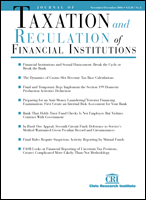Complete Issue
Author: Houman Shadab.
Source: Volume 27, Number 04, March/April 2014 , pp.1-64(64)

< previous article |return to table of contents
Abstract:
This issue of the Journal of Taxation and Regulation of Financial Institutions begins with an analysis of the mechanics and regulation of the hottest topic in finance, Bitcoin. Richard B. Levin, Aaron A. O’Brien, and Stephanie A. Osterman explain the basic nature and mechanics of the world’s first decentralized virtual currency. The authors then turn to a discussion of recent enforcement actions by the U.S. Department of Justice against virtual currency users and how money transmitter regulation may apply to intermediaries that trade Bitcoin or parties that trade futures and securities involving Bitcoin. Our second article, by Alan I. Appel and Gregory J. Galvin, discusses recent changes by the Internal Revenue Service and the Treasury Department to address a discrepancy in the way stock dividends and equivalent swap payments are taxed. The authors explain and provide examples of how the proposed regulations adopt an objective test to determine whether a payment is subject to a withholding tax under the scope of Section 871(m). Our third article is the last in a series on various aspects of credit card taxation by Joseph C. Mandarino. In the current article, Mr. Mandarino discusses how interest income is measured for tax purposes by a card issuer. He notes that the measurement is based on a monthly payment rate methodology and covers various examples and the treatment of bad debt. Heightened regulation of banks by the Federal Reserve under the Dodd-Frank Act of 2010 does not apply solely to U.S. banks. As examined in our fourth article, by Kathleen A. Scott, non-U.S. banks that operate in the U.S. are subject to a comprehensive regulatory regime with the Federal Reserve as their primary regulator. Ms. Scott discusses the nature ofpermissible activities by foreign banks in the U.S., the qualifications of their holding companies, and the requirement that they abide by U.S. statutory requirements such as maintaining “living wills.”While large internationally active non-U.S. banks are the subject of most regulatory energy and reform efforts, smaller foreign banks often operate small offices in this country. As discussed in this issue’s fifth article by Muhammad Hussein, small foreign bank offices are primarily used to offer their homecountry customers access to U.S.-based lines of credit and other financial services and to purchase U.S. Treasuries. Mr. Hussein describes the history of these small U.S.-based offices, their regulation at the federal and state level, and legal concerns the offices may pose to U.S. institutions. This issue concludes with our U.S./International column. Phillip R. Hirschfeld provides a retrospective on 2013 developments related to the Foreign Account Tax Compliance Act, which included issuance of final regulations, Notice 2013-43, registration of Foreign Financial Institutions, and the signing of intergovernmental agreements.Keywords: Bitcoin; virtual currency; dividend withholding; IRC Section 871(m); Capital One Financial Corp. v. Comm’r; foreign bank; International Banking Act; international trade finance; foreign bank offices; Foreign Account Tax Compliance Act
Affiliations:
1: New York Law School.